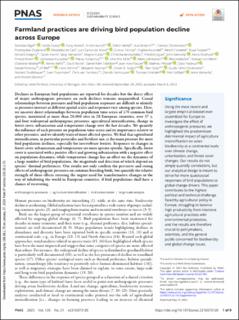Farmland practices are driving bird population decline across Europe
| dc.contributor.author | Rigal, Stanislas | |
| dc.contributor.author | Dakos, Vasilis | |
| dc.contributor.author | Alonso, Hany | |
| dc.contributor.author | Auniņš, Ainārs | |
| dc.contributor.author | Benkő, Zoltán | |
| dc.contributor.author | Brotons, Lluís | |
| dc.contributor.author | Chodkiewicz, Tomasz | |
| dc.contributor.author | Chylarecki, Przemysław | |
| dc.contributor.author | de Carli, Elisabetta | |
| dc.contributor.author | del Moral, Juan Carlos | |
| dc.contributor.author | Domșa, Cristian | |
| dc.contributor.author | Escandell, Virginia | |
| dc.contributor.author | Fontaine, Benoît | |
| dc.contributor.author | Foppen, Ruud | |
| dc.contributor.author | Gregory, Richard | |
| dc.contributor.author | Harris, Sarah | |
| dc.contributor.author | Herrando, Sergi | |
| dc.contributor.author | Husby, Magne | |
| dc.contributor.author | Ieronymidou, Christina | |
| dc.contributor.author | Jiguet, Frédéric | |
| dc.contributor.author | Kennedy, John | |
| dc.contributor.author | Klvaňová, Alena | |
| dc.contributor.author | Kmecl, Primož | |
| dc.contributor.author | Kuczyński, Lechosław | |
| dc.contributor.author | Kurlavičius, Petras | |
| dc.contributor.author | Kålås, John Atle | |
| dc.contributor.author | Lehikoinen, Aleksi | |
| dc.contributor.author | Lindström, Åke | |
| dc.contributor.author | Lorrillière, Romain | |
| dc.contributor.author | Moshøj, Charlotte | |
| dc.contributor.author | Nellis, Renno | |
| dc.contributor.author | Noble, David | |
| dc.contributor.author | Eskildsen, Daniel Palm | |
| dc.contributor.author | Paquet, Jean-Yves | |
| dc.contributor.author | Pélissié, Mathieu | |
| dc.contributor.author | Pladevall, Clara | |
| dc.contributor.author | Portolou, Danae | |
| dc.contributor.author | Reif, Jiří | |
| dc.contributor.author | Schmid, Hans | |
| dc.contributor.author | Seaman, Benjamin | |
| dc.contributor.author | Szabo, Zoltán D. | |
| dc.contributor.author | Szép, Tibor | |
| dc.contributor.author | Teufelbauer, Norbert | |
| dc.contributor.author | Trautmann, Sven | |
| dc.contributor.author | van Turnhout, Chris | |
| dc.contributor.author | Vermouzek, Zdeněk | |
| dc.contributor.author | Vikstrøm, Thomas | |
| dc.contributor.author | Voříšek, Petr | |
| dc.contributor.author | Weiserbs, Anne | |
| dc.contributor.author | Florenzano, Guido Tellini | |
| dc.contributor.author | Devictor, Vincent | |
| dc.date.accessioned | 2024-02-07T12:57:18Z | |
| dc.date.available | 2024-02-07T12:57:18Z | |
| dc.date.created | 2023-06-26T11:10:31Z | |
| dc.date.issued | 2023 | |
| dc.identifier.citation | Rigal, S., Dakos, V., Alonso, H., Auniņš, A., Benkő, Z., Brotons, L., Chodkiewicz, T., Chylarecki, P., de Carli, E., del Moral, J. C., Domșa, C., Escandell, V., Fontaine, B., Foppen, R., Gregory, R., Harris, S., Herrando, S., Husby, M., Ieronymidou, C., (...) Devictor, V. (2023). Farmland practices are driving bird population decline across Europe. Proceedings of the National Academy of Sciences of the United States of America, 120(21): e2216573120. doi: | en_US |
| dc.identifier.issn | 1091-6490 | |
| dc.identifier.uri | https://hdl.handle.net/11250/3116185 | |
| dc.description.abstract | Declines in European bird populations are reported for decades but the direct effect of major anthropogenic pressures on such declines remains unquantified. Causal relationships between pressures and bird population responses are difficult to identify as pressures interact at different spatial scales and responses vary among species. Here, we uncover direct relationships between population time-series of 170 common bird species, monitored at more than 20,000 sites in 28 European countries, over 37 y, and four widespread anthropogenic pressures: agricultural intensification, change in forest cover, urbanisation and temperature change over the last decades. We quantify the influence of each pressure on population time-series and its importance relative to other pressures, and we identify traits of most affected species. We find that agricultural intensification, in particular pesticides and fertiliser use, is the main pressure for most bird population declines, especially for invertebrate feeders. Responses to changes in forest cover, urbanisation and temperature are more species-specific. Specifically, forest cover is associated with a positive effect and growing urbanisation with a negative effect on population dynamics, while temperature change has an effect on the dynamics of a large number of bird populations, the magnitude and direction of which depend on species' thermal preferences. Our results not only confirm the pervasive and strong effects of anthropogenic pressures on common breeding birds, but quantify the relative strength of these effects stressing the urgent need for transformative changes in the way of inhabiting the world in European countries, if bird populations shall have a chance of recovering. | en_US |
| dc.language.iso | eng | en_US |
| dc.publisher | The National Academy of Sciences | en_US |
| dc.rights | Navngivelse 4.0 Internasjonal | * |
| dc.rights.uri | http://creativecommons.org/licenses/by/4.0/deed.no | * |
| dc.title | Farmland practices are driving bird population decline across Europe | en_US |
| dc.type | Peer reviewed | en_US |
| dc.type | Journal article | en_US |
| dc.description.version | publishedVersion | en_US |
| dc.rights.holder | © 2023 The Author(s) | en_US |
| dc.source.pagenumber | 9 | en_US |
| dc.source.volume | 120 | en_US |
| dc.source.journal | Proceedings of the National Academy of Sciences of the United States of America | en_US |
| dc.source.issue | 21 | en_US |
| dc.identifier.doi | 10.1073/pnas.2216573120 | |
| dc.identifier.cristin | 2157913 | |
| dc.source.articlenumber | e2216573120 | en_US |

